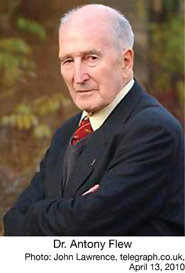

Editor’s Note: Graham Fisher of Buckinghamshire, England, published the following article in the Christian Worker (July 2010), which he edits. He gave us permission to share this insightful story of the man who was known as “the world’s leading atheist.”
 On Thursday, 8th April 2010 a man died
whom I knew. Well, I didn’t really know him, in any meaningful sense of
the word “know”, and he definitely didn’t know me at all, nevertheless
I knew him in a very weak sense of the word “knew”. He was one of the
professors at the university I attended and he achieved international
fame in his field. Since at Keele, my university, had what they called
a “Foundation Year” before you began your degree studies proper, all
departments and all professors lectured in the basic course entitled “A
History of Western Civilisation.” This began with astronomy, then on to
geology, biology, and so on. It was their attempt to broaden your
education and we were forced to study subjects we never had before and
in areas not our field. Students of the arts had to take sciences and
vice versa and I think it was probably the best thing that ever
happened to me educationally. It was a superb course. And this
professor gave me, and over 250 others, several lectures over the
process of the series of lessons and that’s how I knew him — and why he
didn’t know me. I was only one amongst 250. I also attended quite a few
debates he held with other professors on campus, and since we all lived
on campus, staff and students alike, you would see him buzzing around
just like everybody else. Even those who were not his students felt he
was one of their professors, joined mystically to them in a camaraderie
which transcended the academic and the narrower confines of subjects or
departments.
On Thursday, 8th April 2010 a man died
whom I knew. Well, I didn’t really know him, in any meaningful sense of
the word “know”, and he definitely didn’t know me at all, nevertheless
I knew him in a very weak sense of the word “knew”. He was one of the
professors at the university I attended and he achieved international
fame in his field. Since at Keele, my university, had what they called
a “Foundation Year” before you began your degree studies proper, all
departments and all professors lectured in the basic course entitled “A
History of Western Civilisation.” This began with astronomy, then on to
geology, biology, and so on. It was their attempt to broaden your
education and we were forced to study subjects we never had before and
in areas not our field. Students of the arts had to take sciences and
vice versa and I think it was probably the best thing that ever
happened to me educationally. It was a superb course. And this
professor gave me, and over 250 others, several lectures over the
process of the series of lessons and that’s how I knew him — and why he
didn’t know me. I was only one amongst 250. I also attended quite a few
debates he held with other professors on campus, and since we all lived
on campus, staff and students alike, you would see him buzzing around
just like everybody else. Even those who were not his students felt he
was one of their professors, joined mystically to them in a camaraderie
which transcended the academic and the narrower confines of subjects or
departments.Anyway, he died in April aged 87, and I
felt very sad and not a little blue about it. In some daft way a small
piece of “me” had gone and I wish it hadn’t. I wish he’d lived a little
longer. He was a very decent man, a kindly man, a man who valued truth
and was prepared to follow it fearlessly, as he saw it. His name was
Antony Flew and he taught Philosophy. But Antony was an atheist. And
not just an atheist, he was the leading academic atheist in this
country, and one of the leading atheists in the world in his heyday. He
was an international figure in the world of philosophy and his atheism
stemmed solely from philosophical argument. He was an evangelical
atheist, though not “in your face” like Richard Dawkins. Dawkins’s
atheism comes not from any attachment to philosophy but rather from his
field of biological science, so they come at it from completely
different angles. Flew was a believer in evolution, of course, because
the only alternative to that theory extant at the moment is creation by
God — which atheistic evolutionists cannot admit and still be atheists.
His background is interesting. Both his
father and grandfather were Methodist ministers so he had a positively
religious upbringing, which he came to reject in his late teens. I
don’t know the story behind that but it was a good deal more than
simple teenage rebellion. He was very bright indeed and he felt that
religious claims, especially to the existence of God, simply didn’t
stack up. Mind you, I would hazard a guess that his father, at least,
was a believer in evolution — that being the so-called intellectual
position in opposition to a belief in a young Earth created in six days
by divine fiat, some 6,000 years ago, not millions of years ago. A
belief in a biblical world which was created perfectly and then went
wrong after Adam and Eve sinned in the Garden of Eden seemed somewhat
naïve, and still seems somewhat naïve, to the intellectual
classes. Therein stems the origin of his arguments against the notion
as to the existence of God. He did not believe in a fall followed by a
cursed world when God’s original perfection was ruined by sin.
Obviously your starting point, call that your “world view,” will
determine your conclusion no matter how fair and balanced you try to be
as you weigh up the evidence.
 One of his favorite arguments went
like
this: Imagine a garden which was overgrown, full of weeds, thistles and
the like, and therefore a complete mess. Now somebody comes along and
claims that this garden is tended by a gardener who loves and cares for
it. So you look at the mess and you ask, “Where is the evidence for the
existence of this gardener? Have you ever seen him?” It has to be
admitted that this gardener never appears, so he’s never been seen by
anybody — but he exists, believers in the gardener maintain. So you say
that if he does exist he’s an absent gardener and doesn’t care about
the garden, or he’s the worst gardener ever. God, of course, is the
gardener in this story. I doubt that Flew made up the joke based on his
analogy, but whoever did must have known about it. You know the one? It
goes like this: “A vicar was walking down a road and passing a house
with a beautifully kept garden, wonderful
One of his favorite arguments went
like
this: Imagine a garden which was overgrown, full of weeds, thistles and
the like, and therefore a complete mess. Now somebody comes along and
claims that this garden is tended by a gardener who loves and cares for
it. So you look at the mess and you ask, “Where is the evidence for the
existence of this gardener? Have you ever seen him?” It has to be
admitted that this gardener never appears, so he’s never been seen by
anybody — but he exists, believers in the gardener maintain. So you say
that if he does exist he’s an absent gardener and doesn’t care about
the garden, or he’s the worst gardener ever. God, of course, is the
gardener in this story. I doubt that Flew made up the joke based on his
analogy, but whoever did must have known about it. You know the one? It
goes like this: “A vicar was walking down a road and passing a house
with a beautifully kept garden, wonderful  flower beds, grass mown to
perfection, you get the picture, and he saw the gardener working in it.
He knew the man and that he wasn’t a believer or churchgoer, so the
vicar stopped, waved an expansive hand in the direction of the garden,
and accosted him. ‘Bill, isn’t it wonderful what man and God working
together can achieve?’ Bill thought for a moment and scratched his chin
before replying, ‘I suppose you’d know about things like that vicar,
but you should have seen it when God had it all to Himself.’ ” A
believer in Adam would have known why there really is a gardener and
why the garden now is in a mess.
flower beds, grass mown to
perfection, you get the picture, and he saw the gardener working in it.
He knew the man and that he wasn’t a believer or churchgoer, so the
vicar stopped, waved an expansive hand in the direction of the garden,
and accosted him. ‘Bill, isn’t it wonderful what man and God working
together can achieve?’ Bill thought for a moment and scratched his chin
before replying, ‘I suppose you’d know about things like that vicar,
but you should have seen it when God had it all to Himself.’ ” A
believer in Adam would have known why there really is a gardener and
why the garden now is in a mess.
 However, professor Tony Flew didn’t
just
base his atheism on his gardener analogy. He maintained that the onus
of proof in a belief belongs to the believer not the opponent. To
sustain such a belief in say, fairies, elves, ghosts, deities, etc.,
it’s the believer who must prove his case not the disbeliever who must
disprove it. Then he would argue that the proposition that “There is a
God” is not a proper proposition for investigation because there is
nothing which a believer would ever accept which would count against
his belief being true. In other words could we, as Christians, accept a
situation where we would test the notion of there being a God and agree
with the unbeliever that if such-and-such happens there is a God but if
something else happens then there isn’t?
However, professor Tony Flew didn’t
just
base his atheism on his gardener analogy. He maintained that the onus
of proof in a belief belongs to the believer not the opponent. To
sustain such a belief in say, fairies, elves, ghosts, deities, etc.,
it’s the believer who must prove his case not the disbeliever who must
disprove it. Then he would argue that the proposition that “There is a
God” is not a proper proposition for investigation because there is
nothing which a believer would ever accept which would count against
his belief being true. In other words could we, as Christians, accept a
situation where we would test the notion of there being a God and agree
with the unbeliever that if such-and-such happens there is a God but if
something else happens then there isn’t?
Let me illustrate this by an
all-too-common situation: somebody we love being involved in a very bad
accident. When we pray to God for them we don’t, can’t, and won’t
specify what answer would count for there being a God or against there
being a God. That’s not on our agenda because we are not praying so we
can test the notion that there is a God. If they recover, we praise God
for His healing mercies; if they do not recover, we praise God for His
wisdom and kindness in saving them from a situation where they would
have no quality of life. In His wisdom, obviously it was the best for
them — and while we wait anxiously for the answer we don’t blame God
for the wait. If they get better, we praise God for answered prayers in
line with our wishes; if they don’t, we bless God for His mercy.
The question that there might not even be
a God, let alone one who cares what happens to our loved ones is not on
the table — because we believe that there is a God though we’ve never
seen Him. We talk to thin air when we pray and believe that there is
One who hears us and answers us, though He doesn’t ever speak directly
to us or show Himself, yet despite this we believe in Him. To a
believer there’s no way that God can lose in this situation no matter
what the outcome, so how can we maintain that there is a God and that
this is not simply self-delusion? This was Flew’s point. No matter what
the outcome, we will see God’s hand in it and won’t ever consider the
proposition that there isn’t a God at all. That’s why Flew maintained
that God’s existence is not a proper proposition to investigate because
it cannot be falsified. It’s just a faith system which is
philosophically invalid. Those inside the system, as we are, believe
our approach is perfectly valid. However, if we were trying to convince
an unbeliever of the existence, love, and care of God, and if he had
any grey matter between his ears, he wouldn’t remotely consider an
approach through prayer and claims of healing for our loved ones, as a
valid test of the existence or otherwise of there being a God. His
question would naturally be, if there is a God and He loves us so much
as we maintain, why didn’t He prevent the accident in the first place?
Of course, if it were just as Flew
suggests, we would have to agree with him but this is not at all how we
assess it. God is not a philosophical proposition, though His
existence, or not, is what most philosophy students cut their
philosophical teeth on. There is plenty of evidence for the existence
of God and therefore why we should be on the inside and praying as we
do. However, there is an end with a twist in it to this story, which is
why I’m sharing it with you, and why I was saddened and a little blue
when I heard of Flew’s death.
Tony Flew was a man genuinely on a quest
for truth. I was saddened because had he started from a different
premise, he could well have found the answer in Jesus, but sadly he
didn’t. Those of us who knew him, and are believers, were hoping
against hope that he would. We were hoping he would live long enough
finally to confess Jesus as Lord — but he didn’t. What gave us this
hope?
 One of the principles he lived by,
or
operated under, came from Socrates, who said: “We must follow the
argument wherever it leads.” In 2004, Professor Antony Flew,
arch-atheist and scourge of Christian believers, published a book in
which he renounced his atheism and declared that there has to be a God.
Many former students were horrified. After all, they were atheists
because he had taught them to be. They had spent a lifetime following
his arguments and believed them to be true. I can’t overstate the
position. If the Pope became a Protestant, or Osama bin Laden confessed
“Jesus is Lord”, or Richard Dawkins became a Young-Earth, Six-Day
Creationist, the shock-waves could not have been bigger — really! In
the end they handled it simply by ignoring it, condescendingly putting
it down to the fact that he was now an old man in his 80s and obviously
going senile. It saved them from having to face up to the truth by
following where the argument leads.
One of the principles he lived by,
or
operated under, came from Socrates, who said: “We must follow the
argument wherever it leads.” In 2004, Professor Antony Flew,
arch-atheist and scourge of Christian believers, published a book in
which he renounced his atheism and declared that there has to be a God.
Many former students were horrified. After all, they were atheists
because he had taught them to be. They had spent a lifetime following
his arguments and believed them to be true. I can’t overstate the
position. If the Pope became a Protestant, or Osama bin Laden confessed
“Jesus is Lord”, or Richard Dawkins became a Young-Earth, Six-Day
Creationist, the shock-waves could not have been bigger — really! In
the end they handled it simply by ignoring it, condescendingly putting
it down to the fact that he was now an old man in his 80s and obviously
going senile. It saved them from having to face up to the truth by
following where the argument leads.
What convinced him? It was simple really.
The discoveries of scientists during his lifetime, particularly in
unravelling DNA, have revealed an amazingly complex world and universe.
Even so-called simple life shows astonishingly complex systems at work.
There is nothing simple about a simple organism. So complex and so
intricate are the workings and design of nature that the possibility
that these things came about by chance is simply nonsense, by whatever
criteria you use to evaluate it. Flew followed the argument where it
led and it led to a designer who designed the world — we call Him God.
That’s where the facts lead, if you follow them. It’s precisely the
argument used by Paul in Romans 1, where he writes: “For I am not
ashamed of the gospel, for it is the power of God for salvation to
everyone who believes, to the Jew first and also to the Greek. For in
it the righteousness of God is revealed from faith for faith, as it is
written, ‘The righteous shall live by faith.’ For the wrath of God is
revealed from heaven against all ungodliness and unrighteousness of
men, who by their unrighteousness suppress the truth. For  what
can
be
known
about God is plain to them, because God has shown it to them. For
his invisible attributes, namely, his
eternal power and divine nature,
have been clearly perceived, ever since the creation of the world, in
the things that have been made. So they are without excuse” (Romans
1:16 – 20, ESV, emphasis added). We can see God in the things that
have
been made, and that’s precisely what Flew saw and, bless his heart, he
was big enough to come out and renounce a lifetime’s belief when faced
with this undeniable truth. It’s God’s own argument to show evidence of
His existence; it’s the biblical approach to the question and it’s the
main approach made today by creationist organizations in their
literature. This is one reason why I make such an effort to teach from
this perspective.
what
can
be
known
about God is plain to them, because God has shown it to them. For
his invisible attributes, namely, his
eternal power and divine nature,
have been clearly perceived, ever since the creation of the world, in
the things that have been made. So they are without excuse” (Romans
1:16 – 20, ESV, emphasis added). We can see God in the things that
have
been made, and that’s precisely what Flew saw and, bless his heart, he
was big enough to come out and renounce a lifetime’s belief when faced
with this undeniable truth. It’s God’s own argument to show evidence of
His existence; it’s the biblical approach to the question and it’s the
main approach made today by creationist organizations in their
literature. This is one reason why I make such an effort to teach from
this perspective.
If you know anything about this area of
study, you will recognize it as the Intelligent Design (ID) argument.
Unfortunately ID on its own does not lead to Jesus as Saviour or even
to the God of the Bible. It just leads to a belief that there is a god
who designed the universe, and no more. This “god” is just a mechanic,
an engineer, who made things, made them work, and essentially now sits
back and watches things unfold from there. He may have made the
“garden” but he doesn’t tend it — Flew could still cling on to his
gardener analogy. This god is a Deist god, not the loving, caring God
we love, serve, and adore. You have to move on from the designer and
ask why would He just opt out? Wouldn’t it be logical for Him to reveal
Himself somehow to the creatures He made? How would we judge this and
find out? And here is where the Bible comes in with the story of how He
not only revealed Himself, He came down and joined in, in the form of
Jesus of Nazareth, was killed and rose from the dead three days later,
thereby proving not only that there is a God but that He does care and
interact and that He hates the mess the world has gotten into and wants
to do something marvelous about it.
 But you see, if you don’t believe
in Adam,
the perfect world God designed and created, and the fall, followed by
the curse, you logically can’t be led to Jesus by the force of the
argument, or rather by following where the argument leads. Because
that’s where it leads, and that’s why when we pray we definitely can
allow God’s hand to be seen in the answers we receive, be it “Yes” or
“No.” Thus we, as believers learn to pray as Jesus did “Nevertheless
Thy will not mine be done,” and then rejoice and praise God in the
outcome no matter which way it turns out.
But you see, if you don’t believe
in Adam,
the perfect world God designed and created, and the fall, followed by
the curse, you logically can’t be led to Jesus by the force of the
argument, or rather by following where the argument leads. Because
that’s where it leads, and that’s why when we pray we definitely can
allow God’s hand to be seen in the answers we receive, be it “Yes” or
“No.” Thus we, as believers learn to pray as Jesus did “Nevertheless
Thy will not mine be done,” and then rejoice and praise God in the
outcome no matter which way it turns out.
Poor old Tony Flew. He died before he was
able to follow the argument wherever it led. He ran out of time, or
maybe he stopped looking because he thought he’d arrived at where it
led. He stopped looking because he hadn’t started from the Bible and
the biblical starting point with Adam, Eve, and the fall. Consequently
he was unable to finish the job. I had hoped he might and that the
angels would now be rejoicing over a sinner who repented and, like the
lost sheep, came back into the fold. Tony died adamantly stating that
he believed in a Deist god, nothing at all like the God of the Bible,
and that he didn’t want to live for ever, indeed he didn’t want
anything “for ever.” Well, I’m sorry but now he’s actually got
something for ever and it’s not at all what he would have wanted, hoped
for, or expected at death. It is something he could never handle
philosophically for philosophers don’t accept that the notion of Hell
is a valid subject for discussion. It is unfalsifiable because there is
nothing which believers would allow to count against it.
It has been said, “There will be no
atheists in Hell.” One second after death every atheist becomes a
believer in God, and that Jesus is Lord. Our God is not just an
intellectual exercise or a philosophical argument, as Professor Antony
Flew sadly now knows, but can do nothing more at all about it.
Back to Contents Does God Exist?, NovDec10.